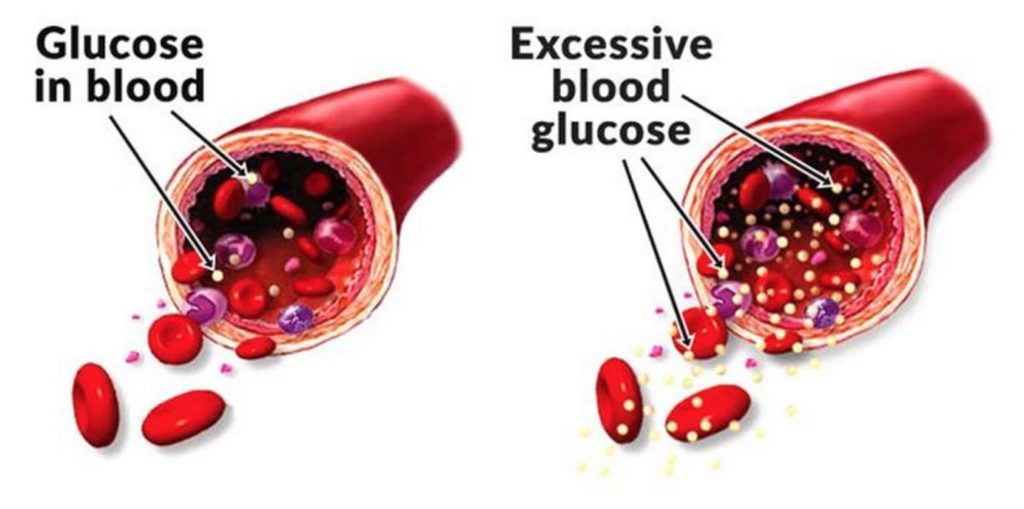Blood sugar plays a key role in cellular energy. Some research suggests that long-term variations in blood sugar levels may be associated with changes in vascular function.
Some studies indicate that long-term fluctuations in blood sugar may be linked to changes in vascular flexibility. Additionally, research suggests that individuals with blood sugar variations may also experience fluctuations in blood pressure.
Exploring the Connection Between Blood Sugar and Blood Pressure
Research suggests that high glucose levels and blood pressure fluctuations may share common contributing factors. Among American adults aged 20 and older who self-report having diabetes, 67% have blood pressure readings higher than 140/90 mm Hg.
Some studies indicate that variations in blood glucose may be associated with changes in blood pressure regulation. Factors that have been explored in research include:
- Vascular Flexibility: Some studies suggest that blood glucose variations may be linked to changes in how blood vessels expand and contract.
- Fluid Balance: Research indicates that kidney function plays a role in regulating fluid retention, which may impact blood pressure.
- Insulin Sensitivity: Some wellness perspectives explore insulin sensitivity as a factor in overall metabolic regulation.
Maintaining balanced blood glucose and blood pressure levels may support overall cardiovascular wellness. Individuals interested in exploring these connections may benefit from speaking with a healthcare professional to determine approaches that best align with their personal wellness goals.

What is blood sugar?
Blood sugar, or glucose, is the main sugar found in your blood. It comes from the food you eat and serves as a primary energy source for the body. Your blood carries glucose to your cells to support energy production.
The sugar that isn’t immediately needed for energy is stored for later use. Maintaining balanced blood sugar levels is considered important for overall metabolic wellness.
Type 2 diabetes is a condition characterized by blood sugar levels that are consistently above established clinical reference ranges. Some research suggests that long-term blood sugar imbalances may be associated with cardiovascular, kidney, and vision health considerations.
How Does the Body Regulate Blood Sugar?
Most of the time, glucose levels increase after eating. When blood sugar rises, cells in the pancreas release insulin, which supports glucose uptake by the body’s cells.
The body regulates blood glucose levels through various metabolic processes. Insulin and glucagon are two primary hormones that play a role in this regulation. Both hormones are secreted by the pancreas and function as part of the endocrine system’s response to changing energy needs.
Blood glucose regulation involves multiple endocrine hormones working in response to metabolic needs, including insulin, glucagon, somatostatin, and amylin. These hormones operate in a dynamic feedback system that supports overall metabolic function.
Why does blood sugar increase?
Carbohydrates such as rice, pasta, and bread are broken down into simple sugars during digestion. These sugars then enter the bloodstream, leading to a temporary increase in blood sugar levels. The pancreas releases insulin, which supports glucose uptake by the body’s cells.
Blood sugar fluctuations may occur when levels rise and then decrease following a meal. Individual responses to food vary based on multiple factors. Some research suggests that long-term variations in blood sugar regulation may be associated with metabolic health considerations.
According to the CDC, approximately 29 million Americans have diabetes, and 25% may not be aware of their condition. Individuals interested in blood sugar regulation may benefit from speaking with a healthcare provider to explore wellness strategies that align with their personal goals.
What Are Commonly Reported Experiences with Blood Sugar Variations?
Some individuals report experiencing a variety of symptoms when blood sugar levels fluctuate. Early signs may include increased thirst, frequent urination, headaches, fatigue, blurred vision, and difficulty concentrating. Over time, additional changes may include variations in weight, changes in skin health, and slower wound healing.
Research suggests that persistent blood sugar variations may be associated with additional health considerations, such as:
- Nerve Sensations: Some individuals report tingling, cold sensations, or numbness in extremities.
- Vision Fluctuations: Changes in glucose levels may influence fluid balance in the eyes, which some individuals report as affecting vision clarity.
- Wound Healing Considerations: Some research explores the impact of blood sugar fluctuations on skin regeneration and healing times.
- Skin Health Variations: Some individuals report changes in skin texture, dryness, or sensitivity.
Other experiences that some people associate with blood sugar variations include fluctuations in appetite, energy levels, and digestion.
Maintaining balanced blood sugar levels may support overall wellness and metabolic function. Individuals interested in exploring strategies for blood sugar balance may benefit from consulting with a qualified healthcare provider.
Circulation and Metabolic Wellness
Some research suggests that circulation plays a role in metabolic processes, and maintaining healthy blood flow may support overall wellness. Cardiovascular function is often explored in relation to blood sugar balance, and some wellness perspectives emphasize circulation as part of metabolic well-being.
Blood Sugar and Stress
Stress is often perceived as an emotional experience, but it also plays a physiological role. During stress, the adrenal glands trigger the release of stored glucose, which may influence energy availability in the body. Some research explores the potential impact of repeated stress responses on blood sugar fluctuations over time.
Ongoing stress is explored in research for its potential role in adrenal function and metabolic balance. Many wellness approaches emphasize stress reduction as a supportive practice for overall well-being.

Stress Management Strategies to Support Well-Being
- Cultivate a positive mindset and reframe stress when possible.
- Practice time management and set priorities.
- Engage in hobbies, social activities, and relaxation techniques.
- Seek support from a mental health professional trained in stress management strategies.
Disclaimer: Doctor Me and You focuses exclusively on wellness education and does not provide medical services. We are not state-licensed physicians and do not diagnose, treat, or prescribe medications for any condition. Information shared during consultations or in communications is not a substitute for medical advice. Always consult a licensed healthcare provider for medical concerns.
